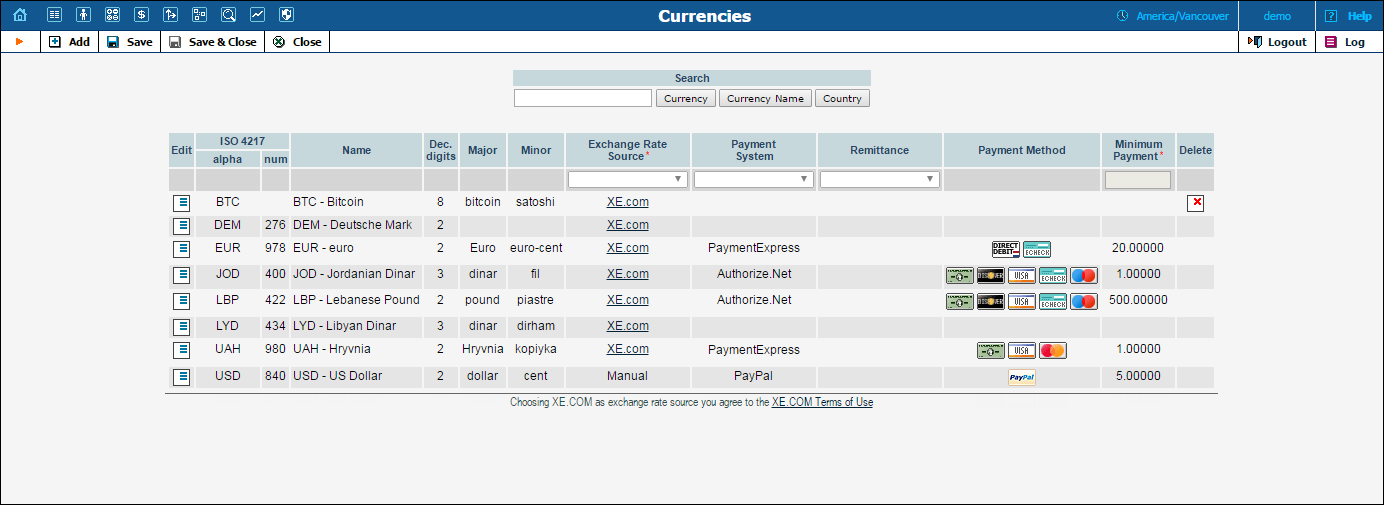 Add
on the toolbar.
Add
on the toolbar.The Currencies page allows you to define a method for determining exchange rates between currencies. Supported methods include explicitly defined exchange rates or the use of external services such as xe.com.
NOTE: Before relying on an external exchange rate service, read its terms of use thoroughly, as the rates it provides are usually given at a delay of at least fifteen minutes from the actual values.
To define an exchange rate source
for a currency, first click  Add
on the toolbar.
Add
on the toolbar.
From the Exchange Rate Source list, choose “Manual entry” or “xe.com”. (The specific exchange rate is defined in the dialog box when adding a new currency or changing the exchange rate source for an existing one.)
The next list shows all payment systems registered by the system’s administrator. Choose one which will be responsible for all payments in this currency using the payment methods chosen for it. If this is not required, select an empty value. It is possible to add multiple combinations of the same currency with different payment systems; in this case, all of them will use the same exchange rate source.
Please note that it is not allowed to have multiple payment systems assigned to the same currency using the same payment method.
Because of charges for the use of online payment systems, it is recommended that a non-zero value be entered in the Minimum Payment field.
Click  Save
to make your changes take effect.
Save
to make your changes take effect.

| Field | Description |
|---|---|
ISO 4217 |
|
alpha |
Official three-letter currency code (e.g. USD). |
Num |
Numeric currency code according to ISO standard. |
Name |
Commonly used name of the currency. |
Dec. digits |
Maximum number of decimal places allowed by the currency, e.g. for US dollars or euros it will be 2, since the smallest unit is one cent (0.01), while for yen it will be 0, because an amount in yens can only be a whole integer. |
Major |
The main currency unit, e.g. dollar. |
Minor |
The lesser currency unit (if applicable), e.g. cent. |
Exchange Rate Source |
Defines the method of entering the exchange rate for this currency: updated either manually by an administrator, or by PortaBilling® from exchange rate sites such as xe.com. For an existing row in the table, click on the underlined xe.com line in a column to immediately fetch the current exchange rate. |
Payment System |
Selects an online payment processor to process payments in this currency. |
Remittance Payment System |
Defines a payment remittance system. Select the corresponding payment remittance system to allow your customers who maintain their balances in this currency to transfer funds from their accounts in PortaSwitch to a mobile phone’s balance in another country.
Note that one currency entry can be assigned to a payment or remittance system or to neither of those options. |
Payment Method |
Read-only column; lists all available payment methods (e.g. VISA) for the selected payment system. |
Minimum Payment |
The smallest allowed amount for an online payment (in the corresponding currency), in order to prevent service abuse. |
The ISO 4217 currency code is normally composed of a country’s two-character ISO 3166 country code plus an extra character denoting the currency unit. For example, the code for Canadian Dollars is simply Canada’s two-character ISO 3166 code (“CA”) plus a one-character currency designator (“D”). Currency unit names (major and minor) are not defined in ISO 4217, and are listed in the table only for user convenience. Visit BSI Currency Code Service (ISO 4217 Maintenance Agency) website http://www.bsi-global.com/ for more information.
In the course of time, some currencies become obsolete. The obsolete currency cannot be added to the system or selected as a base currency. But if it was added and used in the system before becoming obsolete the system will continue working with this currency as before.
Note that when updating the list of exchange rates for existing currencies, if there are any exchange rates for obsolete currencies they will not be updated.